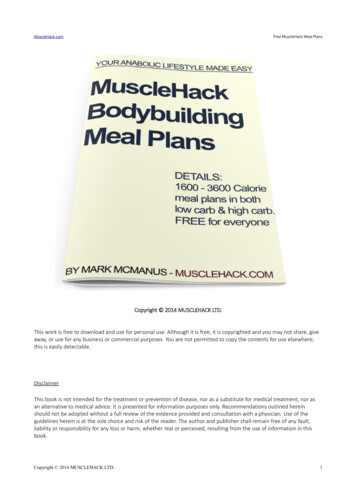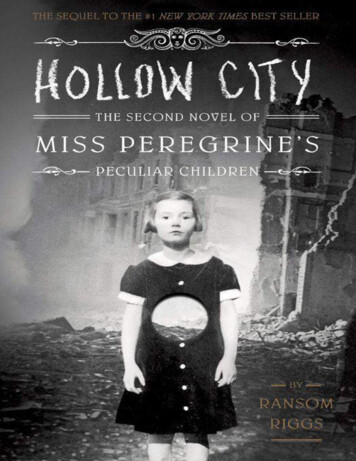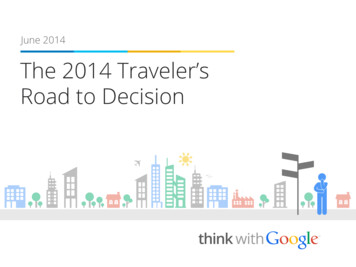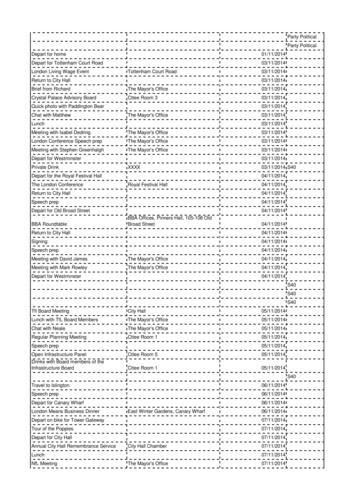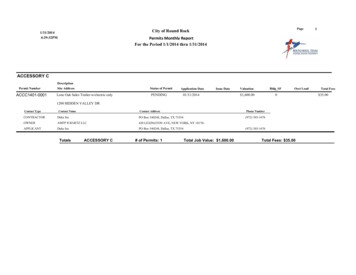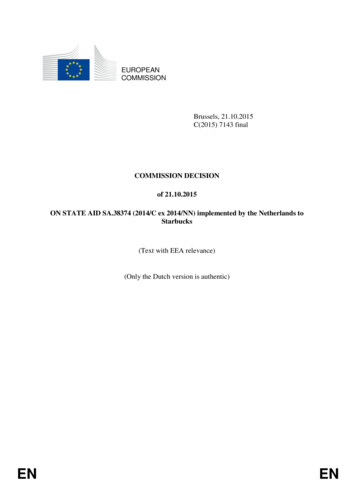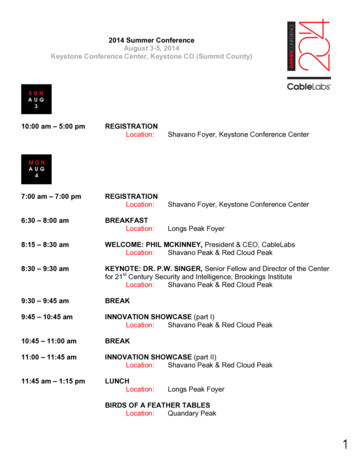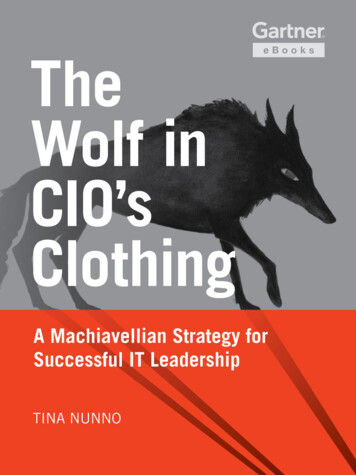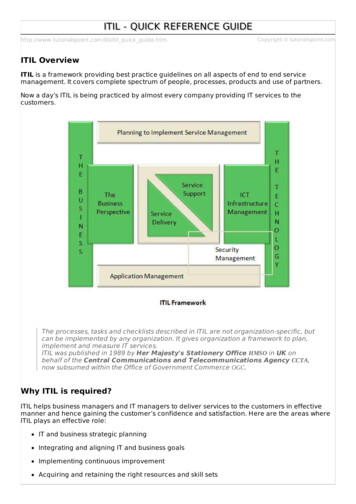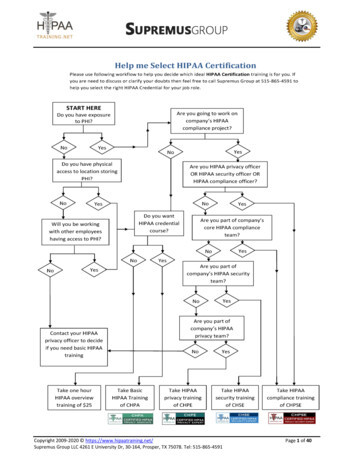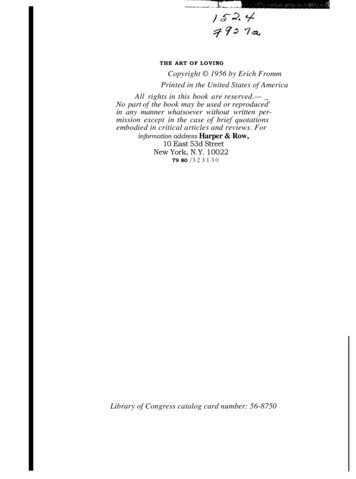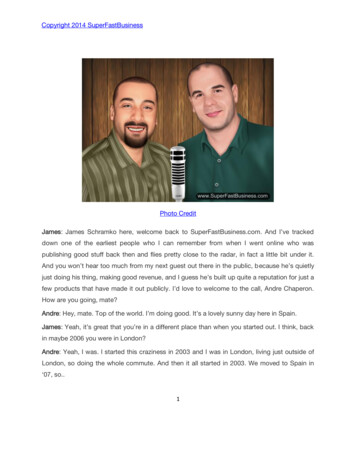
Transcription
Copyright 2014 SuperFastBusinessPhoto CreditJames: James Schramko here, welcome back to SuperFastBusiness.com. And I’ve trackeddown one of the earliest people who I can remember from when I went online who waspublishing good stuff back then and flies pretty close to the radar, in fact a little bit under it.And you won’t hear too much from my next guest out there in the public, because he’s quietlyjust doing his thing, making good revenue, and I guess he’s built up quite a reputation for just afew products that have made it out publicly. I’d love to welcome to the call, Andre Chaperon.How are you going, mate?Andre: Hey, mate. Top of the world. I’m doing good. It’s a lovely sunny day here in Spain.James: Yeah, it’s great that you’re in a different place than when you started out. I think, backin maybe 2006 you were in London?Andre: Yeah, I was. I started this craziness in 2003 and I was in London, living just outside ofLondon, so doing the whole commute. And then it all started in 2003. We moved to Spain in‘07, so.1
Copyright 2014 SuperFastBusinessJames: Gotcha. So I think I started around 2006 was my real sort of first year. And by then,you’d already figured out a lot of stuff. You had a pretty powerful WordPress blog.Andre: Yeah.The “Soap Opera” TechniqueJames: You had an unusual style. It was very different to the American style. You actually hadwell-written content, and you used to publish case studies of actual results, and I rememberyou were posting your campaigns and I’m pretty sure that’s where I got a hold of the idea thatyou should track the results. And you were using tracking IDs and ClickBank. And I was veryinterested in what you were doing there. I picked up some ideas from that. I recall about thattime was when I started messing around with WordPress and knew that I had to track stuff.And then you went on of course to be quite the specialist in email writing autoresponders andyou had a very famous course, Autoresponder Madness, which again when I bought that thefirst time around, you used to email your list occasionally and say, oh, you know, there’ssomething coming, keep your eye out for it. And you’d do this with affiliate offers from time totime, and then you’d do it with your own products. But you have this very seductive emailtechnique, and I think you call it “soap opera.” But I’d love it if you could just give it a little bit ofa window into how this style of email marketing works.Andre: Sure. I’m a shy, reclusive dude, which is why I don’t do these things because it justscares the life out of me, so when I was trying all sorts of things in the very beginning because Ididn’t know what I was doing and I didn’t know what to do, I was just trying all sorts of stuff.And one of the things that really clicked with me, it felt so comfortable and right, was emails. Iguess it’s the perfect medium for someone like me to communicate with a massive audiencewith. You know, I don’t have to jump on video or on an audio thing, I just have to write emails.So yeah, I started writing emails early on and out of all the different things I tried, it was the onething that I really enjoyed doing. And I just used to write stories. It just seemed intuitive to meto – I mean, I wasn’t any good at them back then, but I noticed that when I was telling storiesabout what I was doing and my experiences and family and whatever and people were justbonding and connecting with that, so that’s how the whole story thing started.2
Copyright 2014 SuperFastBusinessJames: Well, of course stories are extremely popular these days. A lot more people havefigured out that storytelling is what’s it about, whether it’s the great fraud, Lance Armstrong.and he had like the ultimate comeback story, and you know, it draws people in, they’refascinated by it, everywhere from Hollywood through to your humble email marketer. Andcertainly, I’ve been toying with this a lot, dialling in more personality, behind the scenes stuff. Ithink it’s super compelling. You did get onto it nice and early, but one of the specifictechniques you seem to do is to hold back parts of the story for future episodes, much like aTV series, so that you create that maintained interest.Andre: Yeah. I mean, over time, I grow better at creating the stories and putting them out there.As I was learning more about what I was doing and honing the skill and the more I wasconnecting with the right people and reading the right stuff and you know, there was also anelement of I used to enjoy watching TV series like “Lost” and “24,” and it just seemed to makesense that you tell stories across multiple emails. So nothing’s written in isolation, so youknow, typically marketers write emails and it’s just like, one email is essentially the whole story,and typically, it’s blind as well. You know, they just want people to click on a link and then gosomewhere. I just took a different approach, and yeah, telling stories across multiple emailsjust seems perfect, and I use some of the techniques that they use in Hollywood, using theopen loops and Through the day, people want to be teased and it builds tension and peoplewill enjoy when there’s no tension and anticipation, people lose interest. I mean, that’s justhuman nature with everything. It’s the reason why those launches, that whole product launchstuff works so well. It’s because it teases and there’s tension and all the cool stuff that ushumans get drawn to.Multiple notepads for storyboardsJames: So would you say that it’s a good technique for someone listening to this to startthinking about how they could tie their emails together more or their communication is, yousaid, not in isolation. I did hear someone credit you with a technique of opening up a wholebunch of different notes all at once, and then writing your email series across multiplenotepads so you could then transfer the story, much like you would a book with chapters.3
Copyright 2014 SuperFastBusinessAndre: Yeah. In Hollywood they use these things called storyboards, so I just borrowed thattechnique. I mean I don’t necessarily do it any more, though I still teach it because when you’restill new to writing emails in a certain way, it’s just easier to stretch out a whole bunch of blanknotepads across your computer screen and then you can just start writing and the story willjust flow across those things and you can visually see and cut and paste different elementsfrom the emails between all the different windows, each notepad representing an email. So youcan just visually see the whole thing. So yeah, that’s a technique that I used, and it’s the one Istill teach, because people can visually see what they’re doing and it’s easy.James: It does make sense. I guess at the very least, I’ve been thinking about how can Imention what’s coming in my next video, to at least think about more than just the one email,kind of like a game of snooker, where you’re thinking about the next shot after – where will thewhite ball be after this one, so that you can line up for the next one.Andre: Right. Yeah, yeah. I mean, all the good TV shows do that. I don’t know if you get E!Entertainment over there James: No, we don’t. There’s no TV in Australia, I probably forgot to mention that, just prior toyour trip here for SuperFastBusiness Live.Andre: (Laughs)James: No. We get a lot of American and UK TV here, as well as local content. It’s quite amixed bag, because we’re such a small country, we don’t really have huge resources.Andre: Yeah. You’re still using CRT computer screens there, no doubt?James: No doubt. Yeah. No, actually, we’re fairly early adapters for stuff, but we are a prettysmall market, so things that cost a lot like television production, we’re not so big into. We stealcontent from other countries. We license it. So we get all the famous American TV showscoming here, but on a little bit of a delay. And it’s really interesting watching how peoplechange their viewing habits with the advent of things like Apple TV. And a lot of people here Ithink are now using proxy VPN sort of facilities to be able to get accounts with NetFlix and 4
Copyright 2014 SuperFastBusinessAndre: Yeah. We don’t have NetFlix in Spain and although we’re connected to the UK, there’sNetFlix UK, but it gets everything like ten years after the US, after the US NetFlix streams justperfectly.Do you need to be a great writer?James: So let’s just continue on, then. We’ve got the idea that we can loop stories around.Some of the things that come to mind are, do you have to be a great writer to be able to writegreat emails?Andre: Well, one thing’s for damn sure, and that is I wasn’t a great writer when I started. Imean, English is my first language, but I still joke I can barely speak English. It was the onesubject I almost failed back in school. I’m dyslexic, so I’m rigged not to be able to write reallywell.James: So you don’t have to be an English major.Andre: No.James: Would you say that your emails fall under the category of conversational? So they’renot like formal English, they’re more just the way that you would speak to a friend?Andre: Oh yeah. I mean, if would show the way that I write now to any English teacher, they’dfail me on the spot. And the only way to write better is two things: is to read more and writemore. It’s the only way to get better.Autoresponders vs. Broadcast EmailsJames: Well, I’ve noticed you do some cool stuff too, like you share book recommendationswith your audience, and you involve people in I remember you sold off some of your old infoproducts. I remember these things, they’re really quite unusual compared to your typicalaffiliate blast. This leads me to a few sort of related questions. Are you doing a lot ofautoresponders for your house lists, or are you a broadcaster?Andre: No, I don’t do broadcasts very much. Well, yeah. I mean, follow-up sequences just areperfect for the type of stuff I do. And also the way that I see it is, when I write an email, I want itto I don’t want it just to be used once. It needs to be used over time, so every piece of asset,5
Copyright 2014 SuperFastBusinessevery asset that I create, there’s an evergreen element to it. And it can be used forever, overtime, so loading up all these emails into a follow-up sequence that are essentially going to bethere for years if I choose to leave them there, it’s just perfect. And then, every single personthat comes into my sphere of influence is going to be exposed to those emails, and obviouslythose emails are all sequenced out in a certain way so it tells a story and it moves people alonga predefined line, and it’s all very predictable. When you’re doing broadcast, I mean, Ben Settledoes daily broadcast emails, and again there’s nothing wrong with the different methodsthat they all work, it’s just for me, I don’t want to write an email and hit the Send button and itgoes out to X thousand people and that’s it. You know, the person that gets added to my list oradds themselves to my list the next day wasn’t exposed to an email that was potentially areally good one or something that could move the needle for somebody.James: Yeah, I guess in my boat I’m a hybrid, because I send broadcast emails every day ortwo, but I also have a bunch of behavioral-based autoresponders that are fired you know,the trigger or the sequence will happen when someone visits a page on my site, or theypurchase a product, then they will be added to a sequence where they start receivinginformation that has been leveraged and structured. I wish there was a way that I couldleverage a lot of my broadcast stuff, but I guess it ties in with my fresh videos.Andre: I mean the hybrid of both works really well as well. It’s not that I don’t send broadcasts;I do, but follow-up sequences basically is the spinal cord of everything. So like you said, whenthe people visit a certain page or they trigger a certain event, it can launch a series of emailsand you can’t do that any other way. And obviously, things that are more time-sensitive, youcan send a broadcast over the top, and that works good. That works well.James: Why do you think you have been held up as such a great email marketer? What sort ofqualities do you think people keep talking about when they come back to you? Anywhere yougo, any Facebook group, any forum, when the topic of email marketing comes up, you getAndre Chaperon, Ben Settle, and then some of the protégés are coming through. You know,like the people who study the material and get sort of public out there, like John McIntyre.What are the things that you think people really admire the most about the stuff you’ve beendoing?6
Copyright 2014 SuperFastBusinessAndre: I think the stuff that I’m known for the most is the soap opera sequences. It’s just thename I gave to sequencing of emails. I just call them soap opera sequences, because that’skind of what it feels like. I think that’s the thing that I’m most well-known for.James: Yeah. So there’s really a lot to be said for naming a process in your industry.Andre: Yeah.James: Get in there early with your name. I do it too. You know, I’ve got Own The Racecourse,and people refer to that when I’m not around. And that’s really one of the goals, I guess.Andre: Yeah.An unusual introvertJames: But it is kind of remarkable to me, because you have been very under the radar. Youhardly ever pop out. But then you do some unusual stuff for an introvert. Like you’ll tell peoplewhen you’re going to an event or wherever and encourage them to meet you and have drinks.So I think you’re really making an effort as a maybe you’re reforming.Andre: Yeah. I’m actually strange. I actually do enjoy meeting people. It’s not like I need to hidein a cupboard all day long. It’s just meeting people in a little setting in a bar setting or whatever,that’s great and I love chatting to people and helping them out like that. It’s just when there’s asetting like this, I guess, I’m doing OK at the moment but yeah, if I were to jump
07.03.2014 · you had a very famous course, Autoresponder Madness, which again when I bought that the first time around, you used to email your list occasionally and say, oh, you
